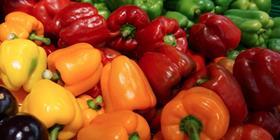
Following recent reports from Spain that crop failures in iceberg lettuce, broccoli and artichoke could cause a repeat of last year’s shortages, concerns have been raised that peppers too could be in limited supply this season.
Asked how likely the UK is to experience another shortfall in the crop this year, Dutch grower Pleun van Malkenhorst said it would all depend on the transition period from Spanish to Dutch supply, due to happen in March and April for most salad veg crops.
One of Spain’s worst droughts on record followed by a cold snap in January led to yield reductions in certain salad vegetables, pushing up import prices. And snow and ice in Spain and Morocco at the beginning of February looks set to disrupt supply further. Complicating the picture, Van Malkenhorst of Rainbow Growers says Dutch peppers have been delayed by “very dark” weather this year, suggesting a potential gap in supply when sourcing switches. “At one point in early January some of the [early planted] crops were a full two weeks behind,” he said.
The grower does not expect shortages to continue once the summer season is on its way, but he says he is hoping for consistent weather in the early spring to even out any potential troughs in supply. Thanet Earth, meanwhile, says it is “monitoring” the situation and is confident in its supply-and-demand planning.
Similar delays have been experienced in cucumbers, with a small number of Dutch growers affected by damage to young plants during Storm Eleanor at the start of January. Since the UK relies heavily on imports, Lea Valley grower Lee Stiles says “a shortage could occur if field-grown crops or those grown under plastic abroad experience a severe weather incident,” however he stresses that shortages in the Lea Valley are unlikely.
The area to the north east of London is the UK’s ‘cucumber capital’ and this winter the Lea Valley Growers’ Association grew its first crop of the vegetable under LED lighting, using a high-wire method. Stiles says the technique is becoming increasingly popular due to the substantially higher yields it delivers, but there’s one major drawback: it’s considerably more labour-intensive, requiring more leaf cutting.
When it comes to packaging – a hot topic at the moment – Stiles warned that calls for supermarkets to stop shrink wrapping cucumbers risked increasing food waste by shortening the product’s shelf life. The Cucumber Growers Association estimates that 490 tonnes of plastic is used to cover cucumbers in the UK each year. And in December Lord Hayward called on supermarkets to follow the example of European retailers, which he says offer a larger selection of unwrapped cucumbers. The Co-op’s environment manager is among those to have opposed such a move, saying his supermarket discovered in a 2012 trial that wrapping cucumbers reduces food waste by two thirds.
In celery, G’s marketing director Anthony Gardiner says the producer is looking at ways of adding value to the vegetable by making it more convenient for consumers and foodservice operators. “We have invested in improving the quality of our celery stick packs through the development of our ready-to-eat processing factory in Spain,” he said. The facility was commissioned by G’s last year as the company looks to drive convenience sales and make the most of the trend for healthy snacking.
In radishes, Gardiner said below-average temperatures in the latter half of last summer helped drive strong sales, with penetration continuing to creep up. Around a third of UK households now buy radishes, and Gardiner believes good coverage in the foodie media and improvements to varietal range – to include red, French Breakfast and purple radishes – bode well for the category. Going forward, the company is keen to promote the “versatile snacking nature” of the vegetable through its Love Radish campaign with PR firm PamLloyd.



